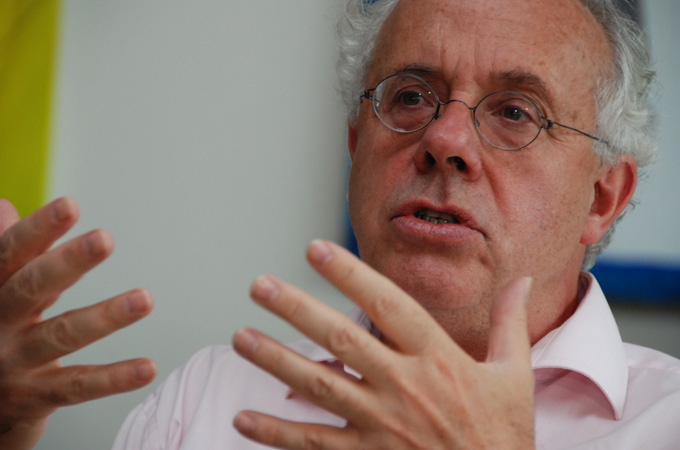The truths and tales of Cuban healthcare
The state-run system has been praised, but many specialists now fear they are falling behind international standards.

If there is one thing for which Cuba has received praise over the years, it is the Communist government’s state-run healthcare system.
Much of this praise is well-deserved. Despite its scarce resources, Cuba has one of the world’s lowest infant mortality rates – just slightly lower than that of the US. Life expectancy is 77.5 years, one of the world’s highest. And until not so long ago, there was one doctor for every 170 citizens – the highest patient-per-doctor ratio in the world.
Keep reading
list of 4 itemsFirst pig kidney in a human: Is this the future of transplants?
Why are some countries decriminalising drugs?
‘No good evidence’ for gender care for youth over long-term, review finds
Of course, the government can afford so many doctors because they are paid extremely low salaries by international standards. The average is between $30 and $50 per month.
And the benefits of this healthcare have not only been felt by Cubans.
Under Fidel Castro, the former Cuban president, hundreds of child victims of the Chernobyl nuclear disaster, left without proper medical attention after the collapse of the Soviet Union, were invited to Cuba. A hospital was constructed to treat them while they and their families set up temporary residence in Tarara, a beautiful seaside neighbourhood near Havana. Many remain there today.
Prevention before cure
|
” Many medicines that cannot be found at a pharmacy are easily bought on the black market. Some doctors, nurses and cleaning staff smuggle the medicine out of the hospitals in a bid to make extra cash. ” |
The Cuban system works – or is supposed to work – by emphasising primary and preventative healthcare.
For any country, but particularly for a poor nation such as Cuba, it is much easier and less expensive to prevent than to cure.
Every square block is assigned a family doctor, or general practitioner, who lives in a small, two-storey house in the neighbourhood. The bottom floor is used to receive patients and the top floor becomes the doctor’s living quarters.
He or she ensures that every child receives the proper vaccinations and that every pregnant woman has a monthly check-up, blood tests, and so on.
The doctor can prescribe medicine which, in theory, can be purchased for practically nothing at state-owned pharmacies – the only pharmacies that exist. And if a patient needs more complex care, he or she is referred to a specialist at a public hospital or clinic.
During the period when the Cuban government received generous subsidies from the former Soviet Union, the system more or less worked well. Hospitals were clean and, although they did not have state-of-the-art equipment, people could rely on them.
But after the subsidies ended and Cuba’s economy went into a tailspin, nothing was the same again.
Decline
By the time I moved to Cuba in 1997, there were serious shortages of medicine – from simple aspirin to more badly needed drugs.
Ironically, many medicines that cannot be found at a pharmacy are easily bought on the black market. Some doctors, nurses and cleaning staff smuggle the medicine out of the hospitals in a bid to make extra cash.
| Cuba’s food challenge |
Although medical attention remains free, many patients did and still do bring their doctors food, money or other gifts to get to the front of the queue or to guarantee an appointment for an X-ray, blood test or operation.
If you do not have a contact or money to pay under the table, the waiting time for all but emergency procedures can be ridiculously long.
Many Cubans complain that top-level government and Communist Party officials have access to VIP health treatment, while ordinary people must queue from dawn for a routine test, with no guarantee that the allotted numbers will not run out before it is their turn.
And while the preventative healthcare system works well for children, women over the age of 40 are being shortchanged because yearly mammograms are not offered to the population at large.
I saw many hospitals where there was often no running water, the toilets did not flush, and the risk of infections – by the hospital’s own admission – was extremely high.
Healthcare for hard currency
In all fairness, in the past five years, the government has made great efforts to improve hospitals and health centres, but again, lack of resources is making the process painfully slow.
The system is free, but it is neither fast nor efficient for two important reasons. One is obviously the lack of financial resources, and the other – which is related to the first – is the “export” of doctors, nurses and dentists in exchange for hard currency.
Thousands of Cuban doctors go to Venezuela to provide primary healthcare there. Their tour of duty lasts a minimum of two years and they are paid approximately $50 a month, plus expenses. In exchange, Hugo Chavez, Venezuela’s president, sends Cuba petrol, part of which can be sold for hard currency.
When a friend of mine was unable to be operated on as scheduled, because there was no anesthesiologist available, “they are all in Venezuela” was a complaint I regularly heard.
Another way the country is attempting to obtain hard currency is to offer health services to foreigners – something that has been dubbed “health tourism”. But some question whether visitors really get what they pay for.
Falling behind
From my experience, there are specialties in which Cuba excels, such as the rehabilitation of patients who have had strokes or are suffering from neurological disorders, such as Parkinson’s disease. Patients who go to CIREN (the Centre for Neurological Regeneration) receive personalised care from well-trained therapists.
But the surgery offered to Parkinson’s sufferers is no longer state-of-the-art by any means.
Cuban specialists complain that they do not have the same opportunities to travel, to attend conferences and to read journals on the latest medical advances as their peers in other countries. They feel, probably correctly, that they are falling behind.
Over the years, I have heard many complain about the deteriorating quality of the services offered. One of the problems is that no small number of Cuban doctors have left the country looking for better opportunities abroad. They are considered deserters.
But for all its shortcomings, Cubans do have better access to healthcare than the majority of those living in many “developing nations”, where public health is shockingly inadequate.
And as with so many things in Cuba, the state health service offers some amazing paradoxes: you may have problems obtaining medicine, but getting a bust lift, or even a sex change, is no problem, and moreover, it is free of charge.
Follow Lucia Newman on Twitter: @lucianewman
<div class=”fixedArea”>
-
 Indian Hospital: Episode 1We go inside a hospital with a difference, where making a profit and providing free medical care goes hand-in-hand.
Indian Hospital: Episode 1We go inside a hospital with a difference, where making a profit and providing free medical care goes hand-in-hand. -
 Indian Hospital: Episode 2We follow a young girl as she realises her dream of a new face and a young man suffering from motor neurone disease.
Indian Hospital: Episode 2We follow a young girl as she realises her dream of a new face and a young man suffering from motor neurone disease. -
 Indian Hospital: Episode 3Can India become the first country in the world to disassociate healthcare from affluence?
Indian Hospital: Episode 3Can India become the first country in the world to disassociate healthcare from affluence? -
 Indian Hospital: Episode 4Dr Shetty is on a mission to reduce the cost of medical care for India’s poor and to empower the country’s women.
Indian Hospital: Episode 4Dr Shetty is on a mission to reduce the cost of medical care for India’s poor and to empower the country’s women. -
 Indian Hospital: Episode 5Dr Shetty’s long-term vision is to change not just India’s but the entire world’s approach to managing health.
Indian Hospital: Episode 5Dr Shetty’s long-term vision is to change not just India’s but the entire world’s approach to managing health. -
 Indian Hospital: Episode 6We follow a young girl who finally receives a new kidney and a trainee surgeon as he assists in a difficult operation.
Indian Hospital: Episode 6We follow a young girl who finally receives a new kidney and a trainee surgeon as he assists in a difficult operation. -
 A vision for global healthcareThe founder of the Naraynana Hrudayalaya describes a vision that could see India disassociate healthcare from affluence.
A vision for global healthcareThe founder of the Naraynana Hrudayalaya describes a vision that could see India disassociate healthcare from affluence. -
 Lessons from the ‘Henry Ford of healthcare’Could the Dr Devi Shetty model deliver affordable healthcare for all?
Lessons from the ‘Henry Ford of healthcare’Could the Dr Devi Shetty model deliver affordable healthcare for all?
</div> </span>